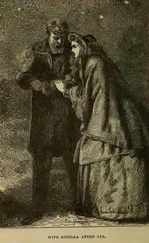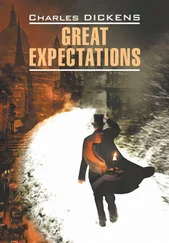“The figures are mounting up, Handel,” Herbert would say; “upon my life, they are mounting up.”
“Be firm, Herbert,” I would retort. “Look into your affairs.”
“What a fellow of resource you are! [169]” my friend would reply, with admiration. “Really your business powers are very remarkable.”
I thought so too. I established with myself, on these occasions, the reputation of a first-rate man of business – prompt, decisive, energetic, clear, cool-headed. One evening we heard a letter dropped through the slit in the said door, and fall on the ground. “It’s for you, Handel,” said Herbert, going out and coming back with it.
The letter was signed Trabb & Co., [170]and its contents were simply, that they begged to inform me that Mrs. J. Gargery had departed this life on Monday last at twenty minutes past six in the evening, and that my attendance was requested on Monday next at three o’clock in the afternoon.
It was the first time that a grave had opened in my road of life. The figure of my sister in her chair by the kitchen fire, haunted me night and day. In my rooms, with which she had never been at all associated, there was at once the smell of death.
Whatever my fortunes might have been, I could scarcely have recalled my sister with much tenderness. Having written to Joe, to offer him consolation, and to assure him that I would come to the funeral, I passed the days in the curious state of mind. I went down early in the morning, and alighted at the Blue Boar in good time to walk over to the forge.
It was fine summer weather. At last I came within sight of the house, and saw that Trabb and Co. had put in a funereal execution and taken possession. Poor dear Joe, entangled in a little black cloak tied in a large bow under his chin, was seated apart at the upper end of the room. When I bent down and said to him, “Dear Joe, how are you?” he said, “Pip, old chap, you knew her when she was a fine figure of a – ” and clasped my hand and said no more.
“Biddy,” said I, “I think you might have written to me about these sad matters.”
“Do you, Mr. Pip?” said Biddy. “I should have written if I had thought that.”
“How are you going to live, Biddy? If you want any mo – ”
“How am I going to live?” repeated Biddy, striking in, with a momentary flush upon her face. “I’ll tell you, Mr. Pip. I am going to try to get the place of mistress in the new school nearly finished here. I can be well recommended by all the neighbors, and I hope I can be industrious and patient, and teach myself while I teach others. You know, Mr. Pip,” pursued Biddy, with a smile, as she raised her eyes to my face, “the new schools are not like the old, but I learnt a good deal from you after that time, and have had time since then to improve.”
Herbert and I went on from bad to worse, in the way of increasing our debts.
I had taken care to have it well understood in Little Britain when my birthday was. On the day before it, I received an official note from Wemmick, informing me that Mr. Jaggers would be glad if I would call upon him at five in the afternoon of the auspicious day. This convinced us that something great was to happen. But Wemmick said nothing respecting it, and motioned me with a nod into my guardian’s room.
It was November, and my guardian was standing before his fire leaning his back against the chimney-piece, with his hands under his coattails. [171]
“Well, Pip,” said he, “I must call you Mr. Pip today. Congratulations, Mr. Pip.”
We shook hands and I thanked him.
“Take a chair, Mr. Pip,” said my guardian.
As I sat down, I felt at a disadvantage, which reminded me of that old time when I had been put upon a tombstone.
“Now my young friend,” my guardian began, “I am going to have a word or two with you.”
“If you please, sir.”
“What do you suppose,” said Mr. Jaggers, “what do you suppose you are living at the rate of? [172]”
“At the rate of, sir?”
“At,” repeated Mr. Jaggers, still looking at the ceiling, “the – rate – of?” And then looked all round the room, and paused with his pocket-handkerchief in his hand, half-way to his nose.
Reluctantly, I confessed myself quite unable to answer the question. This reply seemed agreeable to Mr. Jaggers, who said, “I thought so!” and blew his nose [173]with an air of satisfaction.
“Now, I have asked you a question, my friend,” said Mr. Jaggers. “Have you anything to ask me?”
“Of course it would be a great relief to me to ask you several questions, sir; but I remember your prohibition.”
“Ask one,” said Mr. Jaggers.
“Is my benefactor to be made known to me today?”
“No. Ask another.”
“Have—I – anything to receive, sir?” On that, Mr. Jaggers said, triumphantly, “I thought we should come to it!” and called to Wemmick to give him that piece of paper. Wemmick appeared, handed it in, and disappeared.
“Now, Mr. Pip,” said Mr. Jaggers, “attend, if you please. Your name occurs pretty often in Wemmick’s cash-book; but you are in debt, of course?”
“I am afraid I must say yes, sir.”
“You know you must say yes; don’t you?” said Mr. Jaggers.
“Yes, sir.”
“I don’t ask you what you owe, because you don’t know; and if you did know, you wouldn’t tell me; you would say less. Yes, yes, my friend,” cried Mr. Jaggers, waving his forefinger to stop me as I made a show of protesting: “You’ll excuse me, but I know better than you. Now, take this piece of paper in your hand. You have got it? Very good. Now, unfold it and tell me what it is.”
“This is a bank-note,” said I, “for five hundred pounds.”
“That is a bank-note,” repeated Mr. Jaggers, “for five hundred pounds. And a very handsome sum of money too, I think. You consider it so?”
“How could I do otherwise!”
“Ah! But answer the question,” said Mr. Jaggers.
“Undoubtedly.”
“You consider it, undoubtedly, a handsome sum of money. Now, that handsome sum of money, Pip, is your own. It is a present to you on this day, in earnest of your expectations. [174]And at the rate of that handsome sum of money per annum, and at no higher rate, you are to live until the donor of the whole appears. As I have told you before, I am the mere agent. I execute my instructions, and I am paid for doing so.”
I was beginning to express my gratitude to my benefactor for the great freedom with which I was treated, when Mr. Jaggers stopped me. “I am not paid, Pip,” said he, coolly, “to carry your words to any one. [175]”
“There was a question just now, Mr. Jaggers. I hope I am doing nothing wrong in asking it again?”
“What is it?” said he.
“Is it likely,” I said, after hesitating, “that my patron will soon – ” there I delicately stopped.
“Will soon what?” asked Mr. Jaggers.
“Will soon come to London,” said I, “or summon me anywhere else?”
“Now, here,” replied Mr. Jaggers, “we must come back to the evening when we first met in your village. What did I tell you then, Pip?”
“You told me, Mr. Jaggers, that it might be years hence when that person appeared.”
“Just so,” said Mr. Jaggers, “that’s my answer.”
We looked at one another until I withdrew my eyes, and looked thoughtfully at the floor. When I raised my eyes again, I found that he had been looking at me all the time, and was doing so still.
“If that is all you have to say, sir,” I remarked, “there can be nothing left for me to say.”
He nodded assent, and pulled out his watch, and asked me where I was going to dine? I replied at my own chambers, with Herbert. As a necessary sequence, I asked him if he would favour us with his company, and he promptly accepted the invitation. But he insisted on walking home with me, in order that I might make no extra preparation for him, and first he had a letter or two to write, and (of course) had his hands to wash. So I said I would go into the outer office and talk to Wemmick.
Читать дальше
Конец ознакомительного отрывка
Купить книгу












